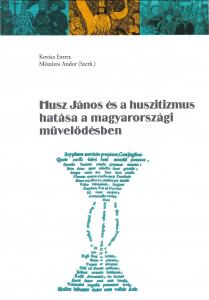
The influence of Jan Hus and Hussitism in the Hungarian culture
The influence of Jan Hus and Hussitism in the Hungarian culture
Edited by Eszter Kovács and Andor Mészáros
NSZL–Saint Adalbert Foundation for Central and Eastern European Research–ELTE Faculty of Humanities, Culture History Department-Centre of Religion Studies, Esztergom–Budapest, 2017., 180 pages
ISBN 978 963 897 093 0
The interaction between Central-European cultures makes itself visible in all the turning points of our history, as the region is covered by a dense web of cultural history relations. The present volume in commemoration of the 600th anniversary of Jan Hus’s death at the stake is a collection of essays on the aspects of the Czech religion reformer and Hussitism itself that imprinted the memory of the 15th century religious reform in the Hungarian culture.
The papers dedicated to the Hungarian aspects of Hussitism from the beginning to the mid-20th century were presented on the conference organized in the autumn of 2015 jointly by the Saint Adalbert Foundation for Central and Eastern European Research, the ELTE Faculty of Humanities Culture History Department-Centre of Religion Studies and National Széchényi Library. The authors look for answers to questions like the origin of the “Hussite Bible” (Klára Korompay), the role Hungarian students in Prague played in the propagation of Hussitism – whether it was as important as previous literature assumed (Péter Haraszti Szabó), how the Czech Hussites reacted to the increasing danger of Ottoman invasion after the lost battle of Mohács (Eszter Kovács), the Czech relations of the Hungarian Protestant Reformation (Andor Mészáros), and the figure and importance of Jan Hus in the works of great Hungarian writers like Mór Jókai (Zsolt Vesztróczy) and László Németh (Csaba Kiss Gy.). Important Hussite-type sources in Hungarian collections are also discussed, including the Antiphon of Esztergom (Judit Lauf), and two incunabulum editions of Jan Hus’s Postilla at National Széchényi Library (Jan Pišna).
In addition to the Hungarian aspects of Hussitism, we considered important to give room to essays elaborating on its Czech relations (Tamás Berkes, Sixtus Bolom-Kotari, Hana Vlhová-Wörner). This is a lesser known area for Hungarian scholars, although very important for research due to the strong influence Hussitism made on the Hungarian culture. Apart from literary and cultural history, the volume also includes interesting details on book history (Attila Verók) and local history (Péter Rokay and Melina Rokay).
List of Contents
- Tamás Berkes: The Hussite movement interpreted by František Palacký
- Sixtus Bolom-Kotari: Jan Hus a husitství v českém protestantismu „dlouhého“ 19. století (Jan Hus, Hussitism and Czech Protestantism in the “long” 19th century)
- Péter Haraszti Szabó: The University of Prague and Hussitism in Hungary – The professors’ role
- Csaba Kiss Gy.: Spirit and Power. The figure of Jan Hus in László Németh’s theatre play
- Klára Korompay: An open question at the intersection of disciplines: the so-called Hussite Bible
- Eszter Kovács: The interpretation of Ottoman danger in the works of Bartoloměj Dvorský and Václav Budovec
- Judit Lauf: Some results of the codicology study of the Hussite Antiphon of Esztergom, and the publication of the text of the ”Transfiguration of Our Lord” chant
- Andor Mészáros: Czech exiles and their printing presses in Hungary
- Pišna, Jan: Norimberská vydání Husovy Postily z let 1563 a 1564 – úvaha nad předmluvami a paratexty (The Nuremberg editions of 1563 and 1564 of Hus’s Postilla. A study of the prefaces and paratexts)
- Péter Rokay-Melina Rokai: The Novi Sad zone, center of Hussite culture in Hungary in the 1430s
- Attila Verók: The Skin of a Hussite Stretched on a Drum? A book historian’s marginal note to the legend of a follower of Hus
- Zsolt Vesztróczy: Heretics, soldiers, robbers, builders of a nation (Hussitism in the historical novels of Jókai)
- Hana Vlhová-Wörner: The birth of Czech language liturgy at the beginning of the 14th century.
Shopping
Our publications are available in our bookshop, or can be ordered from the Publications Department of the NSZL using the contact details below: Főigazgatói Kabinet kiadványtára, Országos Széchényi Könyvtár, 1276 Budapest P.O. box 1205., phone: 06-1-23-23-506, e-mail: kiadvanytar@oszk.hu.




